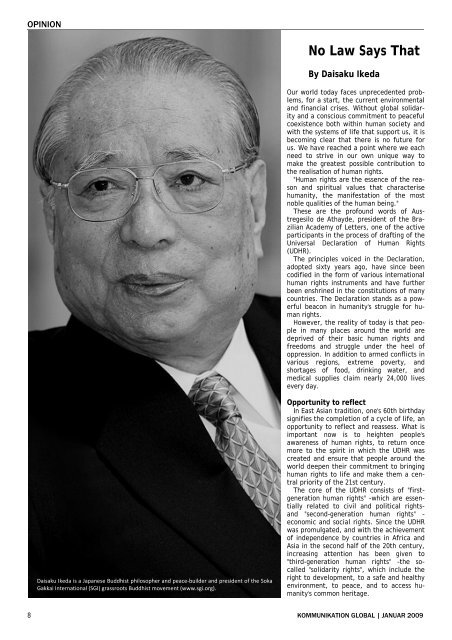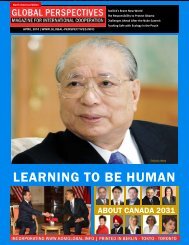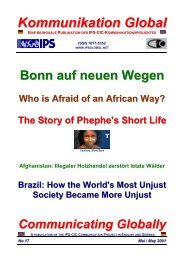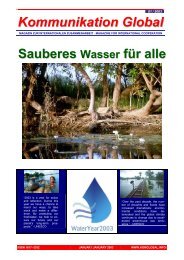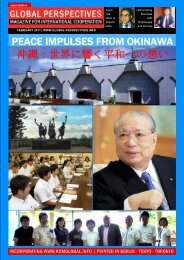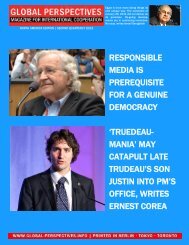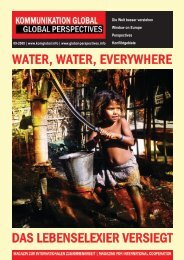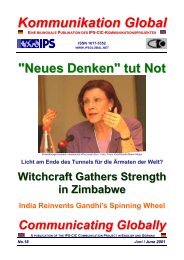GLOBAL PERSPECTIVES | KOMMUNIKATION GLOBAL - 01 | 2009
GLOBAL PERSPECTIVES | KOMMUNIKATION GLOBAL - 01 | 2009
GLOBAL PERSPECTIVES | KOMMUNIKATION GLOBAL - 01 | 2009
You also want an ePaper? Increase the reach of your titles
YUMPU automatically turns print PDFs into web optimized ePapers that Google loves.
OPINION<br />
Daisaku Ikeda is a Japanese Buddhist philosopher and peace‐builder and president of the Soka<br />
Gakkai International (SGI) grassroots Buddhist movement (www.sgi.org).<br />
No Law Says That<br />
By Daisaku Ikeda<br />
Our world today faces unprecedented problems,<br />
for a start, the current environmental<br />
and financial crises. Without global solidarity<br />
and a conscious commitment to peaceful<br />
coexistence both within human society and<br />
with the systems of life that support us, it is<br />
becoming clear that there is no future for<br />
us. We have reached a point where we each<br />
need to strive in our own unique way to<br />
make the greatest possible contribution to<br />
the realisation of human rights.<br />
"Human rights are the essence of the reason<br />
and spiritual values that characterise<br />
humanity, the manifestation of the most<br />
noble qualities of the human being."<br />
These are the profound words of Austregesilo<br />
de Athayde, president of the Brazilian<br />
Academy of Letters, one of the active<br />
participants in the process of drafting of the<br />
Universal Declaration of Human Rights<br />
(UDHR).<br />
The principles voiced in the Declaration,<br />
adopted sixty years ago, have since been<br />
codified in the form of various international<br />
human rights instruments and have further<br />
been enshrined in the constitutions of many<br />
countries. The Declaration stands as a powerful<br />
beacon in humanity's struggle for human<br />
rights.<br />
However, the reality of today is that people<br />
in many places around the world are<br />
deprived of their basic human rights and<br />
freedoms and struggle under the heel of<br />
oppression. In addition to armed conflicts in<br />
various regions, extreme poverty, and<br />
shortages of food, drinking water, and<br />
medical supplies claim nearly 24,000 lives<br />
every day.<br />
Opportunity to reflect<br />
In East Asian tradition, one's 60th birthday<br />
signifies the completion of a cycle of life, an<br />
opportunity to reflect and reassess. What is<br />
important now is to heighten people's<br />
awareness of human rights, to return once<br />
more to the spirit in which the UDHR was<br />
created and ensure that people around the<br />
world deepen their commitment to bringing<br />
human rights to life and make them a central<br />
priority of the 21st century.<br />
The core of the UDHR consists of "firstgeneration<br />
human rights" -which are essentially<br />
related to civil and political rights-<br />
and "second-generation human rights" -<br />
economic and social rights. Since the UDHR<br />
was promulgated, and with the achievement<br />
of independence by countries in Africa and<br />
Asia in the second half of the 20th century,<br />
increasing attention has been given to<br />
"third-generation human rights" -the socalled<br />
"solidarity rights", which include the<br />
right to development, to a safe and healthy<br />
environment, to peace, and to access humanity's<br />
common heritage.<br />
8 <strong>KOMMUNIKATION</strong> <strong>GLOBAL</strong> | JANUAR <strong>2009</strong>


